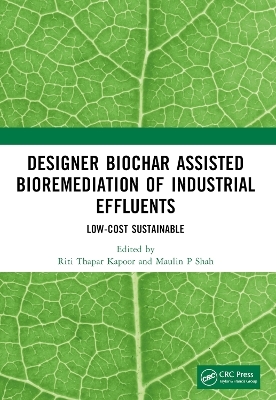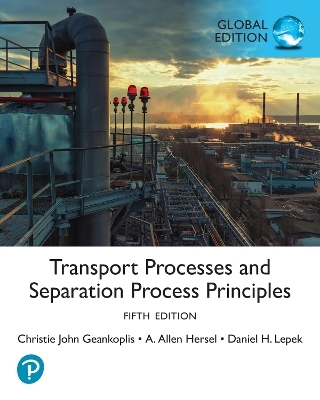
Designer Biochar Assisted Bioremediation of Industrial Effluents
CRC Press (Verlag)
978-1-032-06696-7 (ISBN)
This book provides useful information and applications of biochar produced from agricultural waste for removal of contaminants from industrial effluent and reutilization of waste sludge in the production of biofuel/bioenergy. It describes how designer or modified biochar or combined application (biochar + microbes) can be applied successfully for reuse of wastewater and contaminated soil for ecorestoration, environment protection, and sustainable development. It also deals with the unique features, advantages, and disadvantages of techniques for biochar production and analyses. It underlines a road map in development of future strategy for pollution abatement and sustainable development.
Features:
Provides exhaustive coverage of biochar and its production and properties
Highlights use of biochar in pollution control and environment protection
Covers use of agricultural waste/waste biomass for dye decolorization and degradation
Explores synergistic approaches for contaminants removal for better insights into basic and advanced biotechnological applications
Describes how biochar treatment can be successfully applied for reuse of wastewater and contaminated soil ecorestoration and environment protection
This book is aimed at graduate students and researchers in chemical/biochemical engineering, biotechnology, environmental sciences/engineering, and agriculture engineering.
Riti Thapar Kapoor is Assistant Professor (Grade-III) in Amity Institute of Biotechnology, Amity University Uttar Pradesh, Noida, India. Dr. Kapoor received her PhD from the University of Allahabad and worked as postdoctoral fellow at Banaras Hindu University, Varanasi, India. Dr. Kapoor has 14 years of teaching and research experience, and her area of specialization is environmental biotechnology, bioremediation, and abiotic stresses. Dr. Kapoor is author of three books and editor of five books of international repute (Elsevier, Springer, DeGruyter, etc.). She has published over 80 research papers in various journals of national and international repute. Dr. Kapoor has visited eight countries for participation in different academic programs. Dr. Kapoor has received a prestigious travel award from Bill & Melinda Gates Research Foundation (CGIAR project) for participation in an international training program held at International Rice Research Institute (IRRI), Manila, Philippines in 2010. She is also recipient of a DST travel grant for participation in an International Conference held at Sri Lanka in 2013. Dr. Kapoor has been awarded a Teacher’s Research Fellowship from the Indian Academy of Sciences, Bengaluru, in 2019. Maulin P. Shah is an active researcher and scientific writer in his field for over 20 years. He received a BSc degree (1999) in Microbiology from Gujarat University, Godhra (Gujarat), India. He also earned his PhD degree (2005) in Environmental Microbiology from Sardar Patel University, Vallabh Vidyanagar (Gujarat), India. His research interests include Biological Wastewater Treatment, Environmental Microbiology, Biodegradation, Bioremediation, and Phytoremediation of Environmental Pollutants from Industrial Wastewaters. He has published more than 250 research papers in national and international journals of repute on various aspects of microbial biodegradation and bioremediation of environmental pollutants. He is the editor of 90 books of international repute (RSC, Elsevier, Springer, DeGruyter, Wiley, and CRC Press).
1 Recent Advances in Biochar Production and Its Applications toward Textile Industry Effluent Treatment; 2 Utilization of Modified Biochar for Wastewater Recycling and Management: An Overview; 3 Removal of Emerging Contaminants by Biochar: An Eco-friendly Approach for a Sustainable Environment; 4 Biochar for the Remediation of Heavy-Metal-Contaminated Soil: Present Scenario and Future Challenges; 5 Review on Biochar Production from Biomass and Its Applications in Removing Environmental Pollutants; 6 Modified Biochar for Wastewater Treatment and Reuse; 7 Utilization of Sustainable Biochar Approach to Improve Contaminated Agricultural Soils for Plant Growth Promotion; 8 Prospects of Biochar Technology for Clean Water Provision; 9 Biochar for Removal of Dyes from Industrial Effluents; 10 Efficacy of Biochar in Decontamination of Pesticides; 11 Application of Biochar in the Removal of Organic and Inorganic Contaminants from Wastewater: Mechanism, Operating Conditions, and Modifications; 12 Removal of Pharmaceutical Active Compounds (PhACs) from Wastewater by Designer Biochar; 13 Recent Advances in Dye Removal Technologies by Designer Biochar; 14 Restoration of Contaminated Agricultural Soils Using Modified Biochar; 15 Use of Biochar for the Remediation of Heavy-Metal-Contaminated Soil; 16 Treatment of Industrial Wastewater by Utilization of Biochar as a Green Technology; 17 Biochar Application for Treatment of Industrial Effluent as a Green Technology: Opportunities, Challenges, and Future Perspectives
| Erscheinungsdatum | 11.09.2024 |
|---|---|
| Zusatzinfo | 27 Tables, black and white; 37 Line drawings, black and white; 8 Halftones, black and white; 45 Illustrations, black and white |
| Verlagsort | London |
| Sprache | englisch |
| Maße | 178 x 254 mm |
| Gewicht | 600 g |
| Themenwelt | Technik ► Umwelttechnik / Biotechnologie |
| ISBN-10 | 1-032-06696-2 / 1032066962 |
| ISBN-13 | 978-1-032-06696-7 / 9781032066967 |
| Zustand | Neuware |
| Informationen gemäß Produktsicherheitsverordnung (GPSR) | |
| Haben Sie eine Frage zum Produkt? |
aus dem Bereich


